Art print | Bouquet of white roses in a vase - Jean Misceslas Peské


View from behind

Frame (optional)
In the enchanting world of painting, some artworks captivate through their simplicity and depth. "Art print Bouquet of white roses in a vase - Jean Misceslas Peské" is a perfect example. This painting, delicate and poetic, evokes a subtle harmony between nature and art. The white roses, symbols of purity and innocence, unfold gracefully, offering a visual experience that transcends time. Through this work, Peské invites us to contemplate the ephemeral beauty of flowers while immersing us in a world where each petal tells a story. The soft light caressing the contours of the roses, as well as the transparency of the vase, create a soothing atmosphere conducive to dreaming.
Style and uniqueness of the work
Jean Misceslas Peské's style is characterized by remarkable finesse and mastery of nuances. In "Art print Bouquet of white roses in a vase," he manages to capture the delicacy of the flowers with striking realism. The brushstrokes, both light and precise, bring each rose to life, while the choice of colors enhances the impression of freshness and lightness. The vase, although secondary, plays a crucial role in highlighting the flowers, its shine subtly reflecting the light. Peské knows how to play with shadows and lights, creating a depth that invites the viewer to dive into the artwork. This unique approach gives his work an almost tactile dimension, where one could almost feel the scent of the roses.
The artist and his influence
Jean Misceslas Peské, a painter of Polish origin, managed to mark his era with his distinctive style and passion for nature. Influenced by the great masters of the past, he developed a personal technique that combines tradition and modernity. His work is often imbued with romantic sensitivity, where each painting becomes an ode to the beauty of the natural world. Peské was also a fervent defender of nature, which is reflected in his thematic choices. His bouquets of flowers, and more particularly his roses, testify to an admiration

Matte finish

View from behind

Frame (optional)
In the enchanting world of painting, some artworks captivate through their simplicity and depth. "Art print Bouquet of white roses in a vase - Jean Misceslas Peské" is a perfect example. This painting, delicate and poetic, evokes a subtle harmony between nature and art. The white roses, symbols of purity and innocence, unfold gracefully, offering a visual experience that transcends time. Through this work, Peské invites us to contemplate the ephemeral beauty of flowers while immersing us in a world where each petal tells a story. The soft light caressing the contours of the roses, as well as the transparency of the vase, create a soothing atmosphere conducive to dreaming.
Style and uniqueness of the work
Jean Misceslas Peské's style is characterized by remarkable finesse and mastery of nuances. In "Art print Bouquet of white roses in a vase," he manages to capture the delicacy of the flowers with striking realism. The brushstrokes, both light and precise, bring each rose to life, while the choice of colors enhances the impression of freshness and lightness. The vase, although secondary, plays a crucial role in highlighting the flowers, its shine subtly reflecting the light. Peské knows how to play with shadows and lights, creating a depth that invites the viewer to dive into the artwork. This unique approach gives his work an almost tactile dimension, where one could almost feel the scent of the roses.
The artist and his influence
Jean Misceslas Peské, a painter of Polish origin, managed to mark his era with his distinctive style and passion for nature. Influenced by the great masters of the past, he developed a personal technique that combines tradition and modernity. His work is often imbued with romantic sensitivity, where each painting becomes an ode to the beauty of the natural world. Peské was also a fervent defender of nature, which is reflected in his thematic choices. His bouquets of flowers, and more particularly his roses, testify to an admiration









